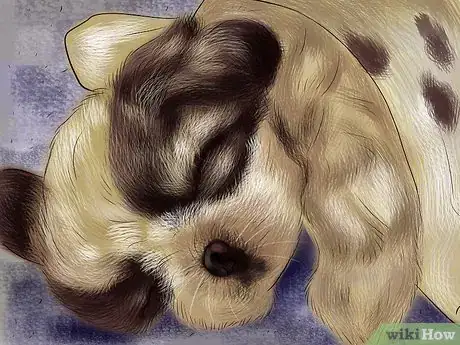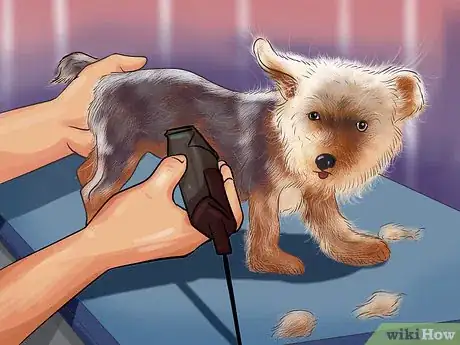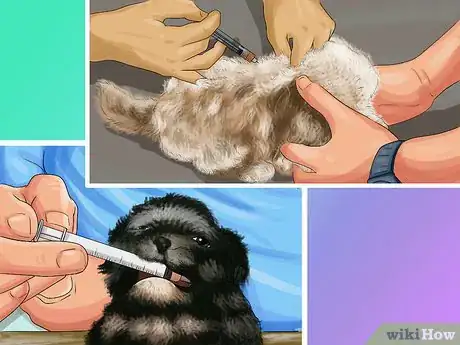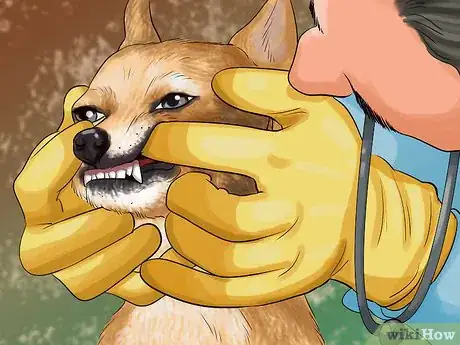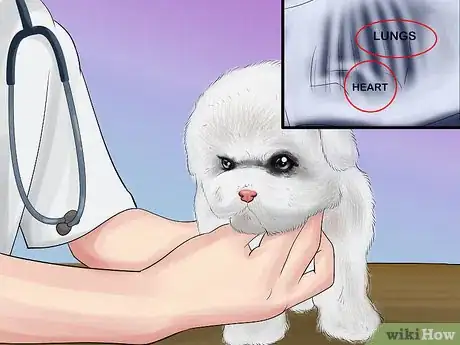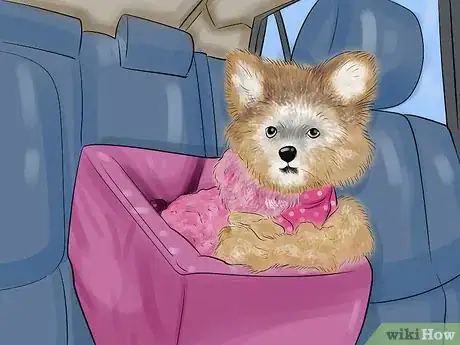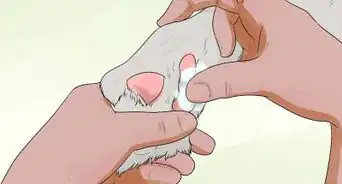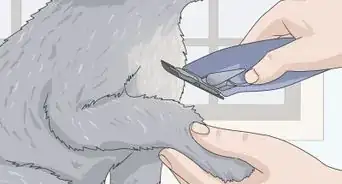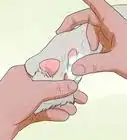This article was co-authored by Melissa Nelson, DVM, PhD. Dr. Nelson is a Veterinarian who specializes in Companion and Large Animal Medicine in Minnesota, where she has over 18 years of experience as a veterinarian in a rural clinic. She received her Doctor of Veterinary Medicine from the University of Minnesota in 1998.
wikiHow marks an article as reader-approved once it receives enough positive feedback. In this case, 89% of readers who voted found the article helpful, earning it our reader-approved status.
This article has been viewed 139,205 times.
Teacup puppies are not a specific breed. They are a very small version of a toy dog, such as Yorkshire terrier, chihuahua, or poodle. In some ways, you care for teacup puppies the same way you would care for any dog. Provide them with fresh food and water and groom them regularly. However, due to their small size, teacup puppies are prone to health problems caused by fragile bones and these health problems can quickly become life-threatening emergencies. You will need to be extra careful when handling a teacup puppy and take it to the vet regularly and plan for medical emergencies.
Steps
Providing Basic Care
-
1Feed puppies a healthy diet. Teacup puppies should be fed a diet rich in fiber. Look for canned or dry foods that contain ingredients like eggs, chicken, fruits, veggies, and omega 3 fatty acids. Also, make sure the dog food you choose contains Karo syrup. Teacup puppies are prone to low blood sugar and this ingredient can help counteract that.[1]
- Talk to your vet about what kinds of puppy chow to purchase. They may have suggestions based on your puppy's specific breed.
- The label of your chosen food should have feeding instructions that let you know how much a puppy should get each day, but also be sure to discuss this with your veterinarian.
-
2Make sure your puppies get rest. Teacup puppies tend to play hard. They tend to feel very tired after activity, especially strenuous play. If your puppy is falling asleep, it is important you give it time to rest.[2]
- Provide a comfortable bed for teacup puppies. After playing with your puppy, place it in its bed. Leave the puppy alone and let it rest for a few hours.
- Teacup puppies need about 14 hours of sleep a day. Limit playtime to hour long sessions to keep your puppy rested.
Advertisement -
3Provide fresh water. Teacup puppies are like any other dog in that they need fresh water available at all times. Make sure to provide a water bowl that your puppy can reach easily. Refill the water bowl each time you notice the water is murky or running low.
- As teacup puppies are small, carefully choose the size of the water bowl. Make sure it's short enough that your puppy can drink from it.
-
4Discourage unwanted behaviors. You should start training a puppy right away so it learns good behavior. Many owners ignore negative behaviors from very small animals, as small dogs cannot cause as much damage. However, you want your puppy to be well behaved so make sure to discipline it for doing things like chewing household objects, unwanted barking, going to the bathroom inside, and being aggressive towards people or other animals.[3]
- If a teacup puppy engages in bad behavior, simply say "No" firmly and then ignore the behavior until it stops. If you are consistent, your teacup puppy will eventually learn which behaviors are inappropriate.
- You should not scold, yell at, or isolate a teacup puppy as punishment. This is ineffective and will only create stress.
-
5Groom your puppy regularly. How often you need to groom your puppy depends on its age. Shorthaired teacup breeds, like some chihuahuas, will not need grooming as often as longhaired breeds like Yorkshire terriers and toy poodles.[4]
- Longhaired puppies should be brushed as their hair becomes tangled with a slick brush and tangles can be worked out with a wide-toothed metal dog comb. You should also carefully clip out any matted fur during the brushing process. Plan for regular, professional groomings during the life of your longhaired teacup puppy.
- Short haired puppies only need a light brushing on occasion.
Seeking Regular Veterinary Care
-
1Have puppies vaccinated and dewormed. As soon as you get a teacup puppy from a shelter or breeder, take it to a vet. If your puppy has not already received a full round of vaccinations, get it vaccinated to prevent diseases like rabies. If your puppy has not been checked for worms, bring in a stool sample to have it evaluated for parasites. If your puppy does have worms, your vet can apply a deworming treatment.[5]
- If you found your puppy at an animal shelter, there is an increased risk of worms. It's important to bring a stool sample to your vet to check.
-
2Talk to your vet about dental care. Since teacup puppies have very small mouths, their teeth are jammed together more closely, which makes them susceptible to plaque accumulation and they don't have the jaw strength to clean teeth through chewing. This can make them prone to dental issues. Have your puppy's teeth examined by a veterinarian. If your vet believes your puppy is at risk for dental issues, they will go over treatment options with you.
- Your vet may suggest special food or treats.
- Your vet may also want you to brush your teacup puppy's teeth regularly.
-
3Schedule more frequent vet visits. Unfortunately, due to their small size, teacup puppies can be very fragile. Your puppy may be prone to heart and lung problems, in addition to issues with bone density. While your puppy is growing, you will need to see a vet more frequently to make sure your puppy is healthy. Your vet can let you know how often you should bring your puppy in. The precise number of visits depends on your puppy's current health, breed, and age.[6]
Protecting Your Teacup Puppy from Size-Related Problems
-
1Protect your dog from trauma. Teacup puppies are very delicate. You should be very careful when holding a teacup puppy. If a teacup puppy is dropped, this could cause serious damage. Be very careful to handle your teacup puppy gently. You should only hold your puppy when necessary and avoid holding it up too high off the ground.[7]
- Be careful about letting the puppy jump off beds or couches since it is possible for them to break their legs this way. Provide them with a step of some kind or just place them on the ground.
-
2Monitor children's interaction with teacup puppies carefully. Children may play rough with puppies, which can easily injure a teacup. Watch young children carefully as they handle a teacup puppy and step in if they're getting too rough.[8]
- It may be a bad idea to get a teacup puppy if you have very young children.
-
3Be careful when taking your pet outdoors. Teacup puppies are more vulnerable to hazards like cars and other dogs. They are also at risk for being stepped on if they get underfoot. Make sure to keep a close eye on your puppy during walks to keep track of where it is. Gently pull on the leash to direct it away from other dogs or oncoming traffic.[9]
Expert Q&A
Did you know you can get expert answers for this article?
Unlock expert answers by supporting wikiHow
-
QuestionHow big does a micro teacup Yorkie get?
 Melissa Nelson, DVM, PhDDr. Nelson is a Veterinarian who specializes in Companion and Large Animal Medicine in Minnesota, where she has over 18 years of experience as a veterinarian in a rural clinic. She received her Doctor of Veterinary Medicine from the University of Minnesota in 1998.
Melissa Nelson, DVM, PhDDr. Nelson is a Veterinarian who specializes in Companion and Large Animal Medicine in Minnesota, where she has over 18 years of experience as a veterinarian in a rural clinic. She received her Doctor of Veterinary Medicine from the University of Minnesota in 1998.
Veterinarian
-
QuestionWhat do you feed a Chihuahua puppy? Or a teacup Yorkie?
 Melissa Nelson, DVM, PhDDr. Nelson is a Veterinarian who specializes in Companion and Large Animal Medicine in Minnesota, where she has over 18 years of experience as a veterinarian in a rural clinic. She received her Doctor of Veterinary Medicine from the University of Minnesota in 1998.
Melissa Nelson, DVM, PhDDr. Nelson is a Veterinarian who specializes in Companion and Large Animal Medicine in Minnesota, where she has over 18 years of experience as a veterinarian in a rural clinic. She received her Doctor of Veterinary Medicine from the University of Minnesota in 1998.
Veterinarian
-
QuestionDo Teacup Yorkies have health problems?
 Melissa Nelson, DVM, PhDDr. Nelson is a Veterinarian who specializes in Companion and Large Animal Medicine in Minnesota, where she has over 18 years of experience as a veterinarian in a rural clinic. She received her Doctor of Veterinary Medicine from the University of Minnesota in 1998.
Melissa Nelson, DVM, PhDDr. Nelson is a Veterinarian who specializes in Companion and Large Animal Medicine in Minnesota, where she has over 18 years of experience as a veterinarian in a rural clinic. She received her Doctor of Veterinary Medicine from the University of Minnesota in 1998.
Veterinarian
References
- ↑ https://www.teacupdogdaily.com/teacup-puppies-care-tips/
- ↑ https://www.teacupdogdaily.com/teacup-puppies-care-tips/
- ↑ https://www.teacupdogdaily.com/teacup-puppies-care-tips/
- ↑ https://www.teacupdogdaily.com/teacup-puppies-care-tips/
- ↑ https://www.teacupdogdaily.com/teacup-puppies-care-tips/
- ↑ https://www.petmaltese.com/teacup-miniature-maltese
- ↑ http://www.petchidog.com/miniature-teacup-chihuahua
- ↑ https://www.teacupdogdaily.com/teacup-puppies-care-tips/
- ↑ https://www.teacupdogdaily.com/teacup-puppies-care-tips/

